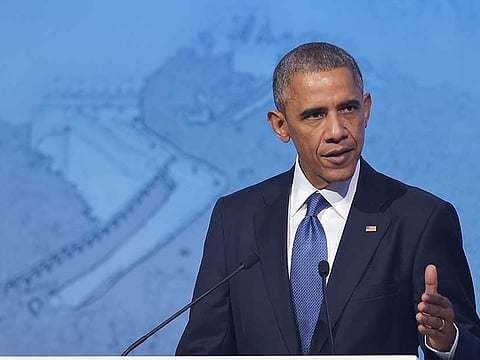Obama’s illegal war against Daesh
In refusing to publish a serious opinion defending his constitutional authority, the US president is breaching a fundamental principle of rule of law

The war against Daesh (Islamic State of Iraq and the Levant) is now illegal. The War Powers Resolution of 1973 gave President Barack Obama 60 days to gain consent from Congress and required him to end “hostilities” within 30 days if he failed to do so. This 90-day clock expired last week.
Obama asserts, however, that he has independent authority to wage his new campaign on the basis of Congress’ old authorisations of former president George W. Bush’s wars against Al Qaida and Saddam Hussain.
His claims have provoked criticisms from scholars of all political persuasions. Nevertheless, the administration has not published a serious legal opinion backing up its extravagant statutory interpretations.
The president’s request at his news conference last Wednesday for a new congressional authorisation does not change his current illegal conduct of the ongoing war.
If it goes unchallenged, it will serve as a precedent for unilateral war-making for decades to come. Congressional leaders will be sorely tempted to bury this issue during next month’s lame-duck session, since it will expose dramatic splits between hawks and doves in both parties.
Congress never passed a real budget for the Pentagon for 2015. It avoided a government shutdown by continuing the 2014 appropriation through December.
This old budget contained an $85 billion (Dh312 billion) contingency fund to cover combat operations, including those in Afghanistan, which have recently come to an end. Since the Afghan withdrawal has greatly reduced the drain on the fund, it has allowed the administration to shift $580 million to finance its war against Daesh.
Lacking legitimacy
Serious constitutionalists should refuse to pass this extension unless they can vote separately on the Daesh appropriation. They should insist on a two-stage process. Since many members won’t be returning in January, the lame-duck Congress lacks the legitimacy to make a final decision on the president’s initiative.
It should therefore grant Obama a limited appropriation giving him sufficient time to gain further authority from the new Congress. If the president fails to get majority support by a specific date — say, May 1 — the bill should stop further spending on the war.
Such a two-step procedure would be sure to provoke an extended public debate — giving critics such as Senators Rand Paul, Republican, and Jeff Merkley, Democrat, a chance to elaborate the grave constitutional problems raised by the president’s course.
This would also give Congress a chance to consider a deeper issue. In refusing to publish a serious opinion defending his constitutional authority, the president is breaching a fundamental principle of the rule of law requiring public accountability.
To prevent future abuses, Congress should amend the War Powers Resolution to require the White House to submit its legal arguments to the House and Senate and explicitly authorise lawmakers to reject spurious presidential claims of compliance.
Americans are at a moment of danger and opportunity. Congress must decide whether it will passively acquiesce in a presidential power-grab or reassert its ultimate authority over war-making established by the Constitution and the War Powers Resolution.
—Washington Post
Bruce Ackerman is a professor of law and political science at Yale University.



